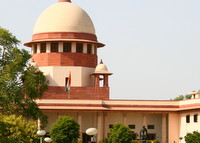The Bench and the Bar
Bar, Bench & Litigation
Madras high court’s controversial Justice C S Karnan has filed long-leave application with the Madras high court to protest the allocation of “insignificant and dummy portfolio” of cases to him by Madras HC Chief Justice Sanjay Kishan Kaul, reported Business Standard.
In a letter to the Chief Justice he wrote: “It is with a heavy heart that I am desirous of proceeding on a long leave as a result of the harassment and belittlement meted out to me by you lordship and to ensure that the decorum of the court is maintained to the satisfaction of the general public.”
He also wrote letters to the Union Law Minister and the Principal Accountant-General in Chennai.
Justice Karnan said that the collegium system of appointment of judges was a doubtful system that promoted only high caste candidates and said it should be rooted out “lock, stock and barrel.”
In January this year, he had stormed into a court of Madras high court hearing petitions in the matter of appointment of judges at the court and initiated a suo motu writ petition against constitution of the collegium at the high court. This eventually led to Supreme Court taking over the matter.
Bar, Bench & Litigation
Polygamy - the practice of taking several wives - is “heinously patriarchal” observed the Gujarat high court even as it quashed the bigamy charges against a muslim man, reported the Times of India.
Gujarat high court justice JB Pardiwala quashed the charges against the man because bigamy and polygamy is currently legal under muslim personal law. But justice Pardiwala called for a uniform civil code in India “on the basis of modern progressive thinking”, and the mandate under Article 14 of the Indian constitution that the state must “endeavour to secure for the citizens a uniform civil code throughout the territory.”
“If the state tolerates this law, it becomes an accomplice in the discrimination of the female, which is illegal under its own laws,” the judge was reported as saying. He also said, “”... It’s for the maulvis and Muslim men to ensure that they do not abuse the Quran to justify the heinously patriarchal act of polygamy in self-interest.”
The courts in India have been vying for uniform civil code and the Supreme Court has asked the government to ensure necessary reforms in various cases. Huffington Post reported that the Supreme Court has observed in various cases that fundamental rights of the citizens affected by these laws. One of the observations in judgment in a christian divorce matter was quoted as “We have to stamp out religion from civil laws. It is very necessary. There are already too many problems because of this.”
Bar, Bench & Litigation
Amity Law School student Paras Jain recovered Rs 15 lakh in damages from India’s first and biggest fairness cream brand Emami, for causing psychological hardship to his brother Nikhil Jain, through its allegedly false claims of fairness, reported The Telegraph.
Emami was also banned from advertising its product “Fair and Handsome” by the district consumer forum in Delhi which awarded Jain the punitive damages and Rs 10,000 to cover the cost of the three-year litigation in the case.
The award of Rs 15 lakh will go to the coffers of Delhi’s _state consumer commission._Jain had filed an unfair trade practices suit against Emami in the consumer court after, contrary to its advertised claim that its cream Fair and Handsome will lighten the skin tone of its consumer within four weeks, there was no change in Jain’s skin tone.
Emami argued in court that its product meant only to improve skin health and quality by providing protection and nourishment to the facial and neck skin to which it is applied. However in its 3 November order the court rejected Emami’s argument because it was contrary to its advertised claim of guaranteed fairness, which therefore constituted “misrepresentation”.
Paras Jain reportedly commented: “While the cream didn’t damage my brother’s skin, it had a psychological effect. The company is playing with the emotions of so many people who want to look and feel better.”
The Advertising Standards Council of India (ASCI) had, even before this court order, prohibited fairness cream ads from showing darker-complexioned people as unhappy or disadvantaged or belonging to any particular socio-economic class, ethnicity or community.
Telegraph added that skin tone can be quantitatively measured using a spectrophotometer and colorimeter and skin specialists claim that constitutive skin colour is determined by cells called melanocytes which are not responsive to any cream. Melanocytes sometimes over-produce a pigment called Melanin, to protect the body from the harmful effects of sun-exposure and this causes skin to “tan”. This can be reduced by external creams.
Bar, Bench & Litigation
In the midst of the melee in Court 4 on 5 November before the constitution bench hearing the proposals on reforming the collegium, counsel arguing for and against the brief adjournment, missed a crucial fact: the present collegium headed by the outgoing CJI, Justice HL Dattu, is unlikely to meet to recommend the names of new Judges, in view of Dattu’s recommendation to the government to elevate the senior-most of his colleagues, Justice TS Thakur, as the CJI, after his retirement on 2 December.
SCOI Reports
At a discussion on the Supreme Court’s recent judgment quashing the 99th Amendment Act and the NJAC Act, eminent academic, Professor Upendra Baxi, defended the judgment, but expected nothing much to come out of the ongoing hearing on reforming the collegium.
SCOI Reports
 Senior counsel Gopal Subramanium has suggested in his 3 November submissions to the Supreme Court that is hearing a consultation on how to reform the collegium system the following seven ways in which the collegium should be improved to improve transparency, formulation of eligibility criteria, establishment of a permanent collegium secretariat and a mechanism to deal with complaints or adverse reports
Senior counsel Gopal Subramanium has suggested in his 3 November submissions to the Supreme Court that is hearing a consultation on how to reform the collegium system the following seven ways in which the collegium should be improved to improve transparency, formulation of eligibility criteria, establishment of a permanent collegium secretariat and a mechanism to deal with complaints or adverse reports
Bar, Bench & Litigation
Uber cab driver Shiv Kumar Yadav who raped a woman executive on 5 December last year was awarded life imprisonment till death by a court here on Tuesday.
Additional Sessions Judge Kaveri Baweja pronounced the order.
Yadav was convicted last month on charges of rape, causing grievous bodily harm and endangering the life of the woman, and other charges dealing with kidnapping, criminal intimidation and voluntarily causing hurt.
On the night of 5 December, the woman hired the cab to head back home in north Delhi’s Inderlok area. Police said Yadav drove the woman to an isolated place and raped her.
SCOI Reports
 As the Supreme Court’s five-Judge Constitution Bench presided over by Justice JS Khehar began its hearing on reforming the collegium (the in-house mechanism to recruit Judges to the higher judiciary after its recent revival by the same bench) the bench sought advice from counsel on both sides on how to navigate the plethora of diverse proposals which it received.
As the Supreme Court’s five-Judge Constitution Bench presided over by Justice JS Khehar began its hearing on reforming the collegium (the in-house mechanism to recruit Judges to the higher judiciary after its recent revival by the same bench) the bench sought advice from counsel on both sides on how to navigate the plethora of diverse proposals which it received.